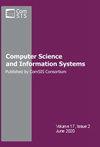Read between the interactions: Understanding non-interacted items for accurate multimedia recommendation
IF 1.2
4区 计算机科学
Q4 COMPUTER SCIENCE, INFORMATION SYSTEMS
引用次数: 0
Abstract
This paper addresses the problem of multimedia recommendation that additionally utilizes multimedia data, such as visual and textual modalities of items along with the user-item interaction information. Existing multimedia recommender systems assume that all the non-interacted items of a user have the same degree of negativity, thus regarding them as candidates for negative samples when training the model. However, this paper claims that a user?s non-interacted items do not have the same degree of negativity. We classify these non-interacted items of a user into two kinds of items with different characteristics: unknown and uninteresting items. Then, we propose a novel negative sampling technique that only considers the uninteresting items (i.e., rather than the unknown items) as candidates for negative samples. In addition, we show that using the multiple Bayesian personalized ranking (BPR) losses with both unknown and uninteresting items (i.e., all the non20 interacted items) in existing multimedia recommendation methods is very effective in improving recommendation accuracy. By conducting extensive experiments with three real-world datasets, we show the superiority of our ideas. Our ideas can be easily and orthogonally applied to any multimedia recommender systems.在交互之间阅读:了解非交互项目,以便进行准确的多媒体推荐
本文讨论了多媒体推荐的问题,多媒体推荐额外利用多媒体数据,如项目的视觉和文本模式以及用户-项目交互信息。现有的多媒体推荐系统假设用户的所有非交互项目都具有相同程度的负性,因此在训练模型时将其视为负样本的候选者。然而,本文声称用户?5个非互动项目不具有相同程度的消极性。我们将用户的这些非交互项目分为两类具有不同特征的项目:未知项目和无趣项目。然后,我们提出了一种新的负抽样技术,它只考虑无兴趣的项目(即,而不是未知的项目)作为负样本的候选者。此外,我们证明了在现有的多媒体推荐方法中使用未知和无兴趣项目(即所有非20交互项目)的多重贝叶斯个性化排名(BPR)损失可以非常有效地提高推荐精度。通过对三个真实世界数据集进行广泛的实验,我们展示了我们的想法的优越性。我们的想法可以很容易地应用于任何多媒体推荐系统。
本文章由计算机程序翻译,如有差异,请以英文原文为准。
求助全文
约1分钟内获得全文
求助全文
来源期刊

Computer Science and Information Systems
COMPUTER SCIENCE, INFORMATION SYSTEMS-COMPUTER SCIENCE, SOFTWARE ENGINEERING
CiteScore
2.30
自引率
21.40%
发文量
76
审稿时长
7.5 months
期刊介绍:
About the journal
Home page
Contact information
Aims and scope
Indexing information
Editorial policies
ComSIS consortium
Journal boards
Managing board
For authors
Information for contributors
Paper submission
Article submission through OJS
Copyright transfer form
Download section
For readers
Forthcoming articles
Current issue
Archive
Subscription
For reviewers
View and review submissions
News
Journal''s Facebook page
Call for special issue
New issue notification
Aims and scope
Computer Science and Information Systems (ComSIS) is an international refereed journal, published in Serbia. The objective of ComSIS is to communicate important research and development results in the areas of computer science, software engineering, and information systems.
 求助内容:
求助内容: 应助结果提醒方式:
应助结果提醒方式:


